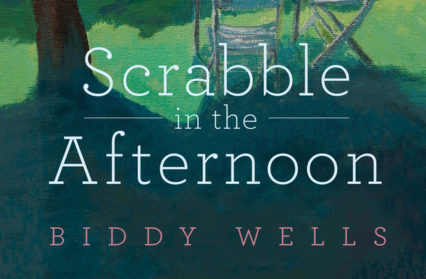Sarah Broughton reviews Biddy Wells’ heart-touching Scrabble in the Afternoon, which tells the true story of how a daughter comes to care for her once-distant mother, and the frustrations, complications and eventual gratitude that evolve along the way.
Biddy Wells’ new memoir, Scrabble in the Afternoon, is a fine addition to other recent explorations of adult children facing the complexities of caring for their ageing parents. In the cinematic adaptation of The Father, writer-director Florian Zeller depicts the dynamic between increasingly exasperated daughter (Olivia Coleman) and her 80-year-old father (Anthony Hopkins), who is in advancing stages of dementia, as she attempts to find support for him. And in Clare Chambers’ novel, Small Pleasures, Jean lives with, and cares for, her ‘suffocatingly dependant’ mother. These fictionalised considerations of the realities faced by approximately 8.8 million adults in the UK, or one in five adults aged between 50–65 to borrow a survey more relevant to Scrabble in the Afternoon, are both heart-rending and brutal.
Biddy Wells takes a non-fiction approach to what she describes as a ‘profoundly challenging episode’ in her life. It’s one that will be familiar to many readers. After her mother collapses with an unexplained illness on New Year’s Day, Wells puts her own life on pause and moves in with the woman she had ‘kept at a distance’ for most of her adult life. The pair had not lived together since Wells was 16 and their relationship was complicated. Decades had passed, elephants were left in rooms and doors had closed and yet here they were, having finally found some sort of equilibrium, back at the coal face together. As Wells puts it, ‘I knew there were deep, old feelings that I had tucked away in a vault labelled: The Past: do Not Open. Could I really live with my mother for more than just a few weeks? What were the chances of keeping the lid on things now that we were sharing a home?’
In fact, twelve long months were to pass as the women struggled in their different ways to get their lives back on track and Wells, to her credit, details the process in unflinching detail. There are the practicalities of day-to-day living, philosophical conversations about death and dying and the joy of playing Scrabble every afternoon, and then darker, more confessional revelations. When Wells hears a snatch of a radio programme where a middle-aged man described caring full-time for his incapacitated mother as ‘not only his duty but his privilege’ she wonders if anyone had dared to say, ‘I resent giving up my life to become a parent to my parent, who, by the way, drives me up the wall’. She is also interesting on the consequences of immersing oneself totally in another person’s life, worried that she might never ‘return to myself or retrieve any sense of direction’ and fearing that her year ‘under house arrest’ had left her ‘sick and toxic’. Despite this, they survive, mother and daughter, albeit changed by their experience.
Part Two of Scrabble in the Afternoon deals with the next stage. Mum moves into a sheltered housing complex and Wells returns to the life she had abandoned a year earlier. Just as she is finding her feet, working out her relationship with her partner David and enjoying regular afternoons with Mum in her flat, life takes a darker turn. Mum has become intensely attached to a younger man, Gerald, who she met in the communal dining room, and Wells finds herself on the outside looking in. More devastatingly, she is now the fall guy for any unhappiness or negativity her mother is experiencing. Here Scrabble in the Afternoon becomes part confessional; urgent, honest, and sometimes a howl of pain: ‘I see your problem and I am sorry about it, but I am not willing to be your emotional dustbin. You’ll have to find another solution’. As mother and daughter battle it out Wells begins to see that the only means of breaking their pattern, their shared history of conflicting expectations of parenting, is to dismantle it; ‘being the adult carer of my elderly mother had given me the opportunity to face and clean up some lifelong wounds. For that I was truly grateful’.
This examination of a sometimes turbulent, but always loving relationship between mother and daughter, the dissection of what it means to be a parent and a child and how becoming an adult carer can prise open historical wounds, is beautifully observed and painfully honest. Scrabble in the Afternoon resonates and illuminates in equal measure.
Scrabble in the Afternoon by Biddy Wells is available now from Parthian.
Sarah Broughton’s latest book is Brando’s Bride (Parthian, 2019), the incredible true story of Anna Kashfi and her marriage to Hollywood’s greatest star.











